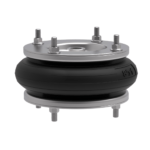Bicycle frames often experience complex movements, especially in full-suspension or articulated systems. Traditional actuators are limited by their rigidity, creating stress points in the frame. In contrast, air bellows tolerate lateral misalignments up to 30 mm and angular deviations up to 25°. This built-in flexibility helps engineers design frames that pivot, flex, and rebound naturally without mechanical interference. A bellow with a 260 mm diameter and 280 mm stroke still maintains smooth operation under torsional loads. This characteristic eliminates the need for precise alignment or additional guide mechanisms. The result is reduced component count and enhanced reliability. Misalignment absorption is particularly valuable on rugged trails or during aggressive maneuvers. Frame fatigue is minimized since the bellow handles variable forces without transferring them to structural members. These design benefits support advanced suspension concepts and improve handling in real-world use. Tevema’s bellows thus empower cycling innovation through technical flexibility, without compromising performance or longevity.
Real-time adjustability enhances ride dynamics
Adaptability is a major advantage of air bellows in bicycle suspension systems. Unlike metal springs, their stiffness can be modified in real time by adjusting internal air pressure. For example, lowering pressure softens the ride, while increasing it stiffens the system. A bellow with 310 mm diameter and 300 mm stroke offers a wide dynamic range—up to 44.4 kN at 7 bar. This flexibility allows tuning for rider weight, terrain type, or ride mode. Systems equipped with onboard pressure control can make automatic adjustments based on sensor input. This creates an intelligent suspension setup that reacts to conditions dynamically. Even without automation, manual adjustment requires only a simple air valve. This capability supports road, trail, and urban use with a single hardware configuration. By offering uniform movements, without stick-slip behavior, Tevema air bellows improve traction, control, and comfort. Cyclists experience superior ride quality that adapts as fast as their route changes.
Endurance under repetitive cycling stress
Suspension components in bicycles endure repetitive stress cycles from pedaling, braking, and terrain impacts. Fatigue resistance is essential to ensure long-term functionality and safety. Tevema’s air bellows are tested to perform over millions of compression cycles without degradation. Their internal structure uses multi-layer fabric reinforcement to handle pressure surges and deformation. A triple-convolution bellow with diameter of 378 mm and stroke of 375 mm can deliver 70.4 kN, yet returns to its original form cycle after cycle. The absence of sliding or rotating parts reduces mechanical wear. In testing, our units maintain pressure integrity and elasticity even under high-frequency vibrations. This ensures suspension response remains consistent from the first ride to the thousandth. The longevity also reduces maintenance costs, particularly in commercial or fleet cycling applications. Engineers seeking durability in challenging environments will appreciate the construction detail and proven lifecycle performance. Tevema’s bellows deliver uncompromised function over extended time frames.
Consistent suspension in all climate conditions
Environmental stability is critical in outdoor cycling. Temperature shifts, humidity, and airborne contaminants can damage typical suspension components. Tevema’s air bellows maintain consistent performance from -40 °C to +115 °C. This wide operating range suits all-weather bikes and competitive use in varied climates. A 12-inch bellow with 85 mm stroke still delivers 43 kN at 7 bar, even in sub-zero conditions. Elastomers like EPDM resist ozone and UV, while stainless steel end closures prevent corrosion. These materials are carefully selected to withstand not just environmental exposure, but also cleaning agents and abrasive dust. Sealed designs protect internal volumes from ingress, maintaining integrity in muddy or snowy conditions. Unlike fluid-based shocks, bellows do not freeze or leak. Storage and handling guidelines follow ISO 2230, ensuring reliable shelf life before use. These combined properties support bicycle applications in cities, mountains, or remote trails. With air bellows, riders gain suspension they can depend on, regardless of climate.
Enabling design freedom for bicycle engineers
By integrating air bellows, bicycle engineers gain new freedom in frame design. Tevema offers sizes ranging from 80 mm to 950 mm in external diameter, with strokes up to 400 mm. This extensive catalog supports both compact frames and extended travel suspensions. Designers can choose from dismountable, crimped, or bead-ring designs to match their configuration needs. The bellows’ low design height simplifies vertical packaging within limited frame space. At the same time, their high axial force capacity and adjustable pressure allow precise tuning. Whether designing for city bikes, e-bikes, or specialized trail models, engineers can implement a custom-fit suspension element without increasing complexity. Structural load paths can be optimized using bellows as both isolators and actuators. By removing metal-on-metal interfaces, bellows reduce noise and improve fatigue life of the entire assembly. This versatility lets frame builders innovate while maintaining strength, comfort, and visual aesthetics. Tevema’s engineering support ensures these ideas become practical realities.

